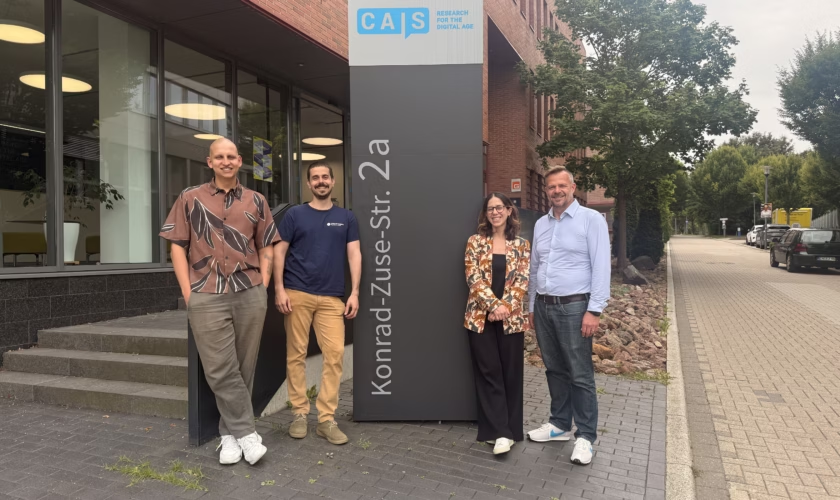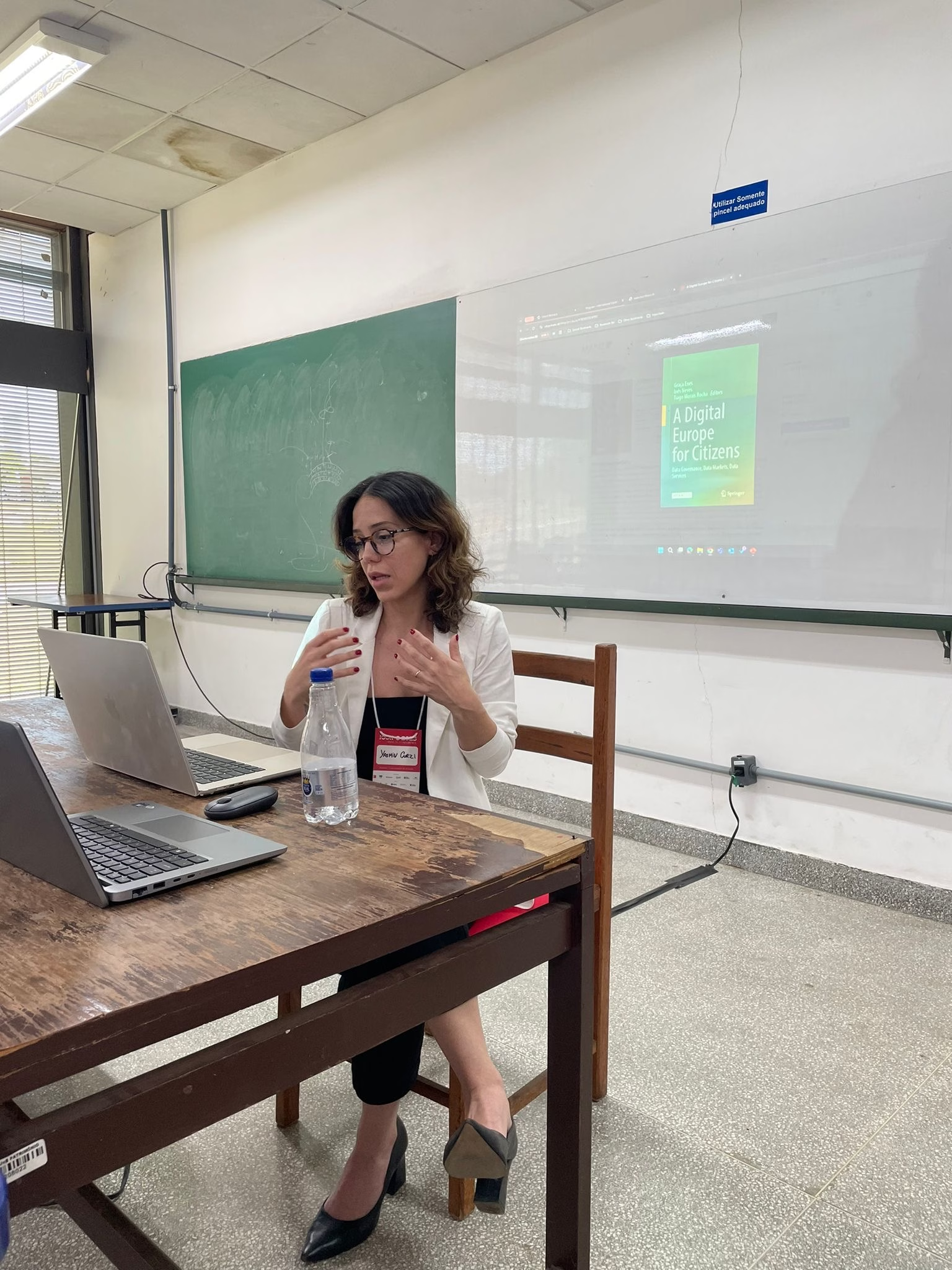
 Yasmin Curzi participated in a five-day interdisciplinary working group at the Center for Advanced Internet Studies in Bochum, Germany. Alongside colleagues Jens Pohlmann (UC Davis), Caio Mello (University of Luxembourg), Dennis Redeker (University of Bremen), and André Ramiro (University of Hamburg / Digital Civil Society Lab, Stanford), she explored social media regulation and freedom of expression across the US, Germany, and Brazil. She examined how historical, cultural, and legal contexts shape national regulatory frameworks and public debates. This collaboration resulted in the establishment of the Cross-border Digital Policy Network, aimed at fostering academic cooperation and transnational research. She also drafted collaborative proposals for research and teaching and developed a structured mixed-methods research pipeline for analyzing digital policy debates.
Yasmin Curzi participated in a five-day interdisciplinary working group at the Center for Advanced Internet Studies in Bochum, Germany. Alongside colleagues Jens Pohlmann (UC Davis), Caio Mello (University of Luxembourg), Dennis Redeker (University of Bremen), and André Ramiro (University of Hamburg / Digital Civil Society Lab, Stanford), she explored social media regulation and freedom of expression across the US, Germany, and Brazil. She examined how historical, cultural, and legal contexts shape national regulatory frameworks and public debates. This collaboration resulted in the establishment of the Cross-border Digital Policy Network, aimed at fostering academic cooperation and transnational research. She also drafted collaborative proposals for research and teaching and developed a structured mixed-methods research pipeline for analyzing digital policy debates.
Yasmin also presented at the International Public Law Conference (ICON•S 2025) in Brasília on the panel titled “Transatlantic Dialogues in the Digital Age: A EU-Brazil Comparison on the Protection of Rights in the Online Environment.” The panel was chaired by Graça Enes (Interdisciplinary Research Center for Justice, Portugal) and featured speakers Graça Enes (Interdisciplinary Research Center for Justice, Portugal), Inês Neves (Faculty of Law, University of Porto; Interdisciplinary Research Center for Justice, Portugal), Tiago Morais Rocha (Faculty of Law, University of Porto, Portugal), and myself. Discussions addressed European and international digital regulation models, insights from the Draghi Report on the Digital Services Package, approaches to disinformation in the EU and Brazil, and research on platform governance and digital rights.
 In May, Ahmed Alrawi traveled to Tokyo, Japan, to present his research on AI, digital journalism, and misinformation at the Asian Conference on the Social Sciences. During the visit, he met with scholars from the Center for Emergency Preparedness and Response at the National Institute of Infectious Diseases, including Tomonori Yamamoto, before continuing to Kyoto and Osaka. Later in the summer, he presented two papers at the International Communication Association (ICA) conference in Denver, Colorado, including “Social Media Use and Identity Fluidity among Youth in Rural Iraq: Reducing Isolation through Digital Platforms”, which was recognized as the Top Faculty Paper in the LGBTQ Studies Interest Group for ICA 2025.
In May, Ahmed Alrawi traveled to Tokyo, Japan, to present his research on AI, digital journalism, and misinformation at the Asian Conference on the Social Sciences. During the visit, he met with scholars from the Center for Emergency Preparedness and Response at the National Institute of Infectious Diseases, including Tomonori Yamamoto, before continuing to Kyoto and Osaka. Later in the summer, he presented two papers at the International Communication Association (ICA) conference in Denver, Colorado, including “Social Media Use and Identity Fluidity among Youth in Rural Iraq: Reducing Isolation through Digital Platforms”, which was recognized as the Top Faculty Paper in the LGBTQ Studies Interest Group for ICA 2025.
This summer, Megan Wiessner was a research fellow at the Canadian Centre for Architecture (CCA) in Montreal, where she conducted additional historical research for her book manuscript, Digital Timber: Carbon, Code, and the New Logistics of Environmental Repair. Looking at the Centre’s collections of building trade materials from the 20th century brought new insight into how recent innovations in digital fabrication are marketed using a century-old public relations playbook. The fellowship provided the opportunity to connect with other fellows studying the politics and production of the world’s built environment—Olga Touloumi (Bard College), Ksenia Litvinenko (Leibniz Institute for Research on Society and Space), and Sarah Hearne (University of Colorado Denver)—as well as with the CCA’s 2025 Indigenous Design Fellows Amina Lalor, Tin Ayala, and Ivana Molina Apaza, Emerging Curators Andy Lu Lee and Yutong Lin, and visiting PhD researchers. As part of this work, she gave a public seminar on her work in July.
Megan also recently spoke on a panel on “Media/Environment: Imbrications and Reverberations” at the Society for the Social Studies of Science Annual Meeting in Seattle, Washington. Organized by Alix Johnson (Macalester College) and Patrick Brodie (University College Dublin), the panel brought together researchers calling attention to how extractive and industrial activities have shaped the evolution of digital communications technologies.
From June 19-28, Maria Lungu conducted field research in New Orleans with the local police department, focusing on predictive policing and surveillance practices. This collaboration involved interviews about localized practices and examining how policies and administration have changed to accommodate both traditional and contemporary policing methods. The findings from this research will be presented at the Conference on Policy Process Research in Bern, Switzerland.
During this period, Maria also participated in the Southeastern Association of Law Schools Annual Conference, where she engaged with legal scholars and practitioners on emerging issues in law, technology, and public safety.
Concurrently, Maria completed the Council of Artificial Intelligence and Digital Policy (CAIDP) group program as a group leader. In this role, she coordinated the creation and dissemination of Council of Europe statements on AI governance and tracked treaty ratifications across member states, fostering a structured approach to transnational AI policy. Statements were distributed to Albania, Japan, the UAE, Uruguay, the Philippines, Chile, Mexico, the EU, the Vatican, Canada, and Turkey.
Also, through her work with CAIDP, she contributed to drafting a Predictive Policing Statement submitted to the UK government, offering guidance on the ethical and legal limitations of AI tools designed to predict homicide. This statement combined empirical evidence, comparative legal analysis, and technical considerations to inform policy decisions and prevent the misuse of predictive algorithms in high-stakes policing contexts.
Finally, on August 15, Maria presented her paper “Bridging the Legal-Technical Gap: AI Surveillance, Legal Challenges, and Data Sovereignty in Africa” as part of the launch of a new project on legal-technical AI governance and regulation in Africa. The project was organized by the University of Pretoria’s Data Science Law Lab in collaboration with Data Science for Social Impact and her paper examines the intersection of surveillance, statutory frameworks, and data sovereignty in African contexts.
In July, Andre Sobral worked on the review process of an article he is submitting to AI & Society. In early August, he participated as a Guest Lecturer in a Systems Engineering class on the Federal University of Rio de Janeiro, where he was able to secure a partnership to replicate his methods to study Brazilian telegram. At the end of August, Andre joined the UVA Postdoctoral Association as a volunteer to help with postdoc advocacy at UVA. In early September, he presented his work “Natural Disasters and Conspiratorial Narratives in Telegram Channels” in the Society for Social Studies of Science conference. Throughout the summer, he continued to mentor Diego DiMattina, an undergraduate student research associate from Computer Sciences, who has been collaborating with Andre and David Nemer on writing a paper together.

